Understanding 8-channel LPCM over HDMI: Why it Matters and Who Supports it
by Anand Lal Shimpi on September 17, 2008 2:00 PM EST- Posted in
- GPUs
The Fix: 8-Channel LPCM over HDMI
But, Wait! There is a solution. It's ok to send uncompressed audio over HDMI, so in theory you could decode TrueHD/DTS-HD audio tracks in software and send them out as decoded, uncompressed LPCM without a Protected Audio Path.
Cyberlink, everyone's favorite player software manufacturer, supports decoding both TrueHD and DTS-HD MA in software (although it appears that Cyberlink does downsample the 24-bit 48kHz LPCM output to 16-bit 48kHz, but at least you get 8 discrete channels even if you lose the bit-for-bit lossless accuracy of the original signal).
With software support and no protection requirements to worry about, all we need is basic hardware support - and here's where most companies have failed miserably over the past couple of years.
It takes a lot of bandwidth to send 8-channels of uncompressed, 24-bit, 48kHz audio to the HDMI display engine. In the early days, GPU makers simply passed along SPDIF, which only offered 1.5Mbps - enough for 5.1 Dolby Digital, 5.1 DTS, or 2-channel LPCM to be sent over HDMI.
Intel guessed right enough to include a wide enough bus on its chipsets between the audio codec and the HDMI output engine to support up to 8-channel LPCM. NVIDIA eventually followed suit with its GeForce 8200 series of IGPs, while AMD is still lacking support for anything above 2-channel LPCM (although all three platforms can give you 5.1-channel DD/DTS over HDMI).
AMD has redeemed itself by being the first standalone GPU maker to offer 8-channel LPCM output over HDMI on discrete graphics cards with the RV7xx series of GPUs.
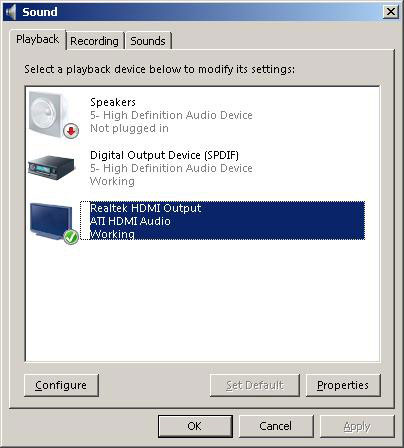
The Realtek codec in the Radeon HD 4800 series GPUs supports 8-channel LPCM over HDMI
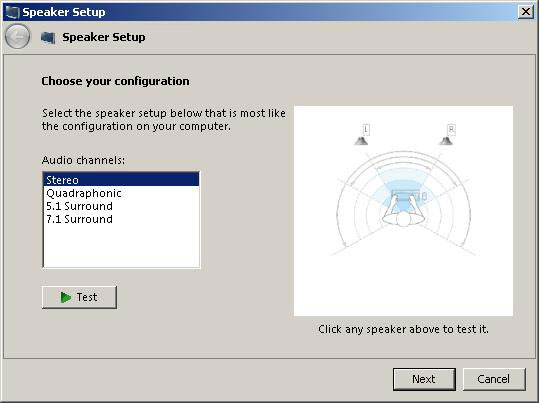
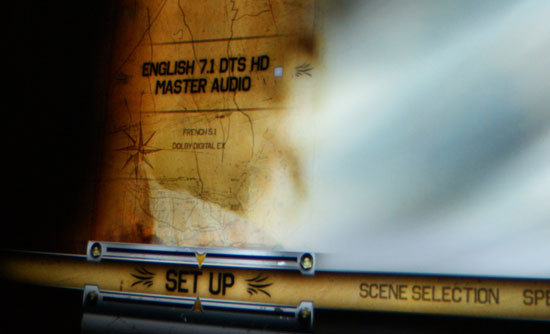
Selecting 8-channel DTS HD MA in Rambo on Blu-ray
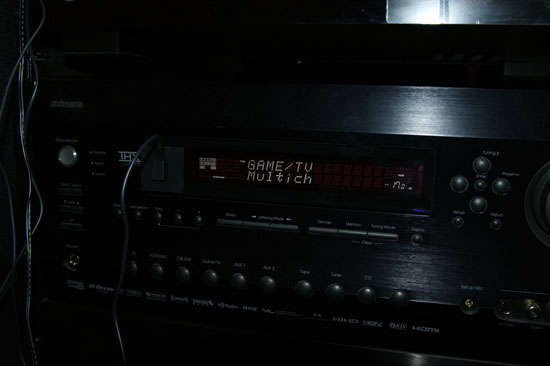
8-channel LPCM from the Radeon HD 4850 to an Integra DTC-9.8
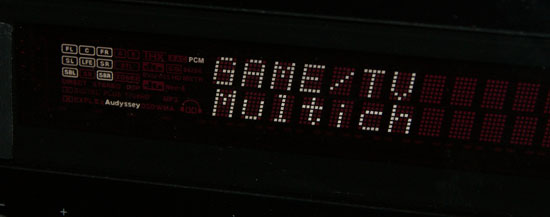
It works!
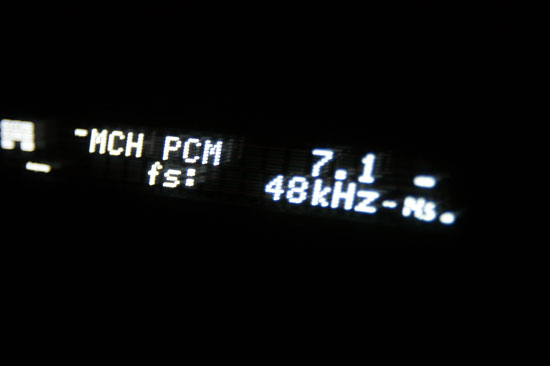
Despite supporting 8-channel LPCM, the G45 still lacks a truly protected audio path and thus will never be able to send an encoded Dolby Digital TrueHD or DTS-HD MA signal over HDMI. I suspect that its successor in 2009 will finally add this functionality.
Whew. There you go, that's what all of this 8-channel LPCM talk is all about. It’s supported on NVIDIA’s GeForce 8200/8300 chipsets, Intel’s G965/G35/G45, and AMD’s Radeon HD 4800 and 4600 series. Done.
















53 Comments
View All Comments
Mastakilla - Wednesday, September 17, 2008 - link
for movies and music the sync issue can be solved on a decent receiver...the big problem is for people (like me) who also want to play games on the same system...
you cannot sync your keyboard / mouse input with a delayed sound / image!
that is the real issue for me and exactly what i would like to see some focus on in a decent (anand) article
the forum link i posted above touches the same topic...
Mastakilla - Wednesday, September 17, 2008 - link
Been waiting for something like this for a long time now...I hope the final in depth article will cover all aspects of sound on a PC (movies, music and gaming)
I have started a thread about the lack of decent information on this topic awhile ago on your forum:
http://forums.anandtech.com/messageview.aspx?catid...">http://forums.anandtech.com/messageview...amp;thre...
this includes a request to review the Auzentech soundcard toghetter with Onkyo or alike receivers as well
Hope you can make this mess a little more clear :)
thanks in advance!
Anand Lal Shimpi - Thursday, September 18, 2008 - link
I don't have the Auzentech card yet but I did just get the ASUS card in and will be working on that shortly. As soon as I get the Auzentech I'll add that to the queue :)-A
Zefram0911 - Wednesday, September 17, 2008 - link
Anyone know when this card is coming out? I've been waiting for it since it's press release in June that said this month.AnnihilatorX - Wednesday, September 17, 2008 - link
Protected path, all the bells and whistles would utterly fails at the end point. To make content viewable, ultimately you need to have it decoded. There is a weakest link between the image processor on your monitor and the HDCP chip. Surely uou can eavesdrop on the electrical signal coming from the monitor's driving circuit.Xenoterranos - Wednesday, September 17, 2008 - link
Well yes, but the mechanism to do that would be hardware based, and thus, somethign you can't download from bloorayhax.ru, which the studios are most affraid of. Remember Css? That didn't go to well for them.(Besides, this is moot. Read the above posts about AnyDVD HD: the encryption has already been broken)
Golgatha - Wednesday, September 17, 2008 - link
I'd be happy if the Cyberlink PowerDVD 8 software would just transcode the lossless audio to 5.1 DD and call it a day. Also, I wish the part of the Blu-ray spec was to require a DD track on the disc along with the lossless format.Case in point. Transformers on Blu-ray only has a TrueHD track on the disc. My HTPC cannot playback the audio in anything but stereo because of the limitations listed in this article.
The idiotic thing about this situation is even if I bought a receiver which supported TrueHD, there is no way for me to get any kind of 5.1/7.1 signal to the receiver due to the DRM implementation, lack of hardware support on the PC side, and lack of software transcoding in any commercially available playback software. Sure my PS3 can do the transcoding and I can watch Transformers with TrueHD downsampled to 5.1 DD, but my HTPC has a much better quality picture due to GPU acceleration magic. Not to mention my HTPC is a nice Blu-ray jukebox (thank you AnyDVD and yes I own the original discs), which can start the movie directly at the beginning of the movie (thank you again AnyDVD) without the ironic "don't steal our content public service message" or any previews (which are outdated and unwanted within 6months anyway and are a waste of my time).
michal1980 - Thursday, September 18, 2008 - link
i'm sorry, can you please explain to me how your htpc has a better picture then the ps3?and please make up better bs then 'gpu acceleration', becasue that is just 'bs'. The ps3 is one of the better blu-ray players on the market, and I have never seen a review mention any problems with its picture quality.
GPU acceleration is required when your CPU is too weak to playback the video, if system a is able to decode the video file, and system b is also able to, but one uses a cpu and one a gpu, then unless there is some post processing (ie changing of the final output after decoding), the picture will look the same.
also, if your reciver can play back true-hd, or dts-ma, then it can playback LPCM. and you know what the difference in sound quality between the 2 is? nearly zero. All that happens is that in the 1st case your receiver decodes the file, while in the 2nd your pc does.
fuzz - Monday, September 22, 2008 - link
well theres probably ZERO difference between htpc and ps3 when it comes to hddvd/bd, but for playing back standard dvd the htpc wins hands down (thanks to the maturity of the technology)you can get around pretty much all the quality-reduction features hollywood could come up with.
erple2 - Monday, October 6, 2008 - link
Maturity of what technology? The tech used in the PS3 for all of that is what boils down to clever software decoding. The question is simply whether the hardware on the PS3 is capable of doing all of the clever algorithmic magic to make the DVD output look good. Some "high end" (read expensive) systems do that, but they also can't put large General Purpose Processors in their components, so they use embedded systems (which are VERY inexpensive) to do the crunch work on those DVD upscale algorithms. I think that the PS3 is more than capable of doing it in software (particularly given it's nVidia G70 based GPU, plus the Cell Processor).